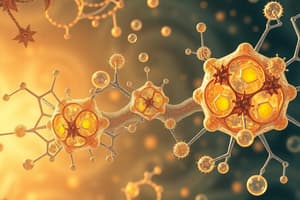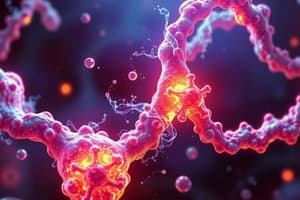Podcast
Questions and Answers
What distinguishes enzymes from being consumed in biochemical reactions?
What distinguishes enzymes from being consumed in biochemical reactions?
- Enzymes require high concentrations to be effective.
- Enzymes are always proteins.
- Enzymes deactivate after a single reaction.
- Enzymes remain unchanged by the end of the reaction. (correct)
Which statement correctly describes enzyme specificity?
Which statement correctly describes enzyme specificity?
- Enzymes can function in both acidic and basic conditions without change.
- Enzymes generally act on several unrelated substrates.
- Enzymes have absolute specificity for a single substrate. (correct)
- Enzymes can interact with a wide variety of substrates.
What is a holoenzyme composed of?
What is a holoenzyme composed of?
- Apoenzyme and cofactor. (correct)
- Protein only.
- Substrate and product.
- Catalyst and inhibitor.
What suffix is commonly used in the names of enzymes derived from their substrates?
What suffix is commonly used in the names of enzymes derived from their substrates?
Which of the following is NOT a characteristic of enzymes?
Which of the following is NOT a characteristic of enzymes?
What model explains the mechanism by which substrates bind to enzymes allowing for a more effective reaction?
What model explains the mechanism by which substrates bind to enzymes allowing for a more effective reaction?
Which of the following components is NOT a type of cofactor that assists enzymes?
Which of the following components is NOT a type of cofactor that assists enzymes?
What role do enzymes play in relation to activation energy?
What role do enzymes play in relation to activation energy?
Which term describes the enzyme-substrate complex after the substrate has reacted but before it dissociates into product?
Which term describes the enzyme-substrate complex after the substrate has reacted but before it dissociates into product?
What distinguishes metalloenzymes from metal-activated enzymes?
What distinguishes metalloenzymes from metal-activated enzymes?
Flashcards
Enzyme definition
Enzyme definition
Enzymes are biological catalysts that speed up chemical reactions in living organisms.
Enzyme specificity
Enzyme specificity
Enzymes are highly selective, interacting with a particular substrate or related substrates and catalyzing only one type of reaction.
Enzyme nomenclature
Enzyme nomenclature
Enzyme names usually end in '-ase' (e.g., sucrase), or they describe the reaction (e.g., lactate dehydrogenase).
Holoenzyme
Holoenzyme
Signup and view all the flashcards
Enzyme function (impact on reaction)
Enzyme function (impact on reaction)
Signup and view all the flashcards
Active Site
Active Site
Signup and view all the flashcards
Induced Fit Model
Induced Fit Model
Signup and view all the flashcards
Enzyme-Substrate Complex
Enzyme-Substrate Complex
Signup and view all the flashcards
Coenzymes
Coenzymes
Signup and view all the flashcards
Prosthetic Groups
Prosthetic Groups
Signup and view all the flashcards




